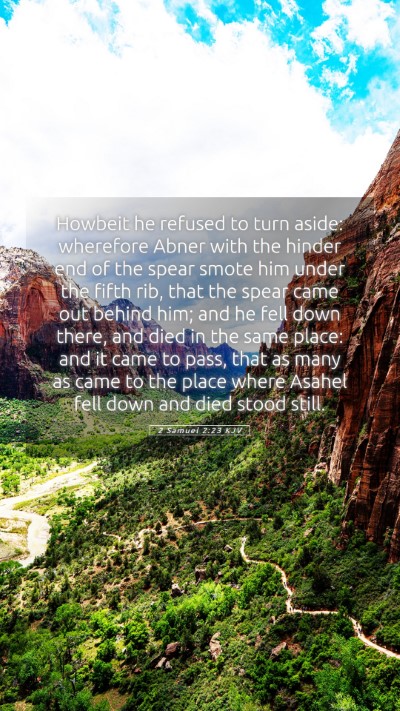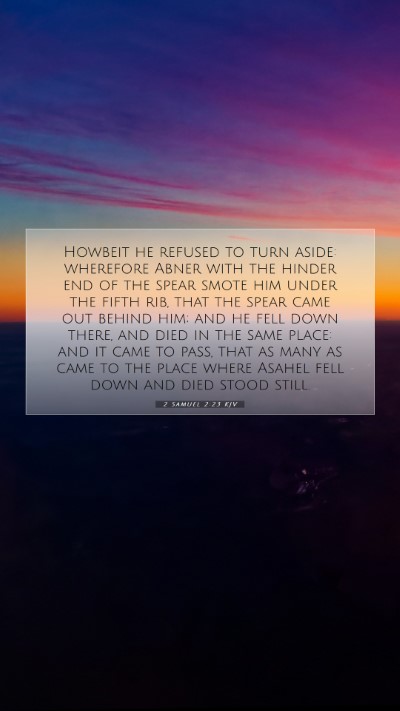Understanding 2 Samuel 2:23
Bible Verse: 2 Samuel 2:23 - "But he refused to turn aside. Therefore Abner struck him in the stomach, so that he died. And so Joab and Abishai pursued Abner." (ESV)
Bible Verse Meanings and Interpretations
This verse captures the intense conflict between Joab and Abner during the power struggles following Saul's death. The significance lies in the themes of loyalty, ambition, and the brutal reality of warfare in ancient Israel.
Commentary Analysis
-
Matthew Henry's Commentary
Matthew Henry emphasizes the moral implications surrounding Joab's refusal to relent in battle. He highlights the deadly consequences of pride and stubbornness in conflict. Joab, motivated by loyalty to David, acts in vengeance rather than in forgiveness, which ultimately leads to Abner's violent end. This illustrates the perilous nature of unchecked ambition and the chaos of civil war.
-
Albert Barnes' Analysis
Albert Barnes points out that Abner’s refusal to stop the conflict signals both the intensity of the rivalry and the harsh reality of leadership transitions during this tumultuous period. He reflects on how personal vendettas overshadowed the greater national interest, presenting a scenario that asks readers to consider the cost of ambition and the thirst for power within the communities of faith.
-
Adam Clarke's Exegesis
Adam Clarke offers an interpretation that examines the historical context of the verse, noting that Abner was a seasoned leader in the opposing faction. Clarke explains that the brutal action taken by Joab was a reflection of the anarchy that characterized the period, and it reveals the often brutal nature of establishing authority. He also emphasizes the notion of loyalty to one's tribe, which sometimes leads to tragic consequences.
Bible Study Insights
This verse serves as a profound example for Bible study groups exploring the themes of conflict and resolution, ambition versus loyalty, and the impact of violence in human relationships. Understanding the deeper meanings within this text can lead to rich discussions on moral choices in leadership.
Historical Context
The historical context surrounding 2 Samuel 2:23 plays a vital role in its interpretation. Following the death of Saul, there was a power vacuum in Israel, leading to factionalism. Joab’s fierce action represents a microcosm of the larger societal struggles during the establishment of David’s kingdom. Engaging with the historical accounts of this time enhances our understanding of scripture.
Applications for Daily Life
This verse prompts readers to reflect on their own conflicts and the motivations behind their actions. In a world where ambition and personal loyalties often collide, 2 Samuel 2:23 calls for introspection on how one navigates the complexities of relationships, particularly in leadership and decision-making contexts.
Suggestions for Bible Study Groups
- Discuss the implications of pride and ambition as illustrated in this conflict.
- Explore how loyalty can lead to both positive outcomes and tragic ends.
- Reflect on the historical circumstances that influence Scriptural narratives.
- Provide tools and resources that help members understand the brutality and complexity of ancient conflicts.
Additional Bible Cross References
- 1 Chronicles 2:16 - Joab's lineage and character.
- 2 Samuel 3:27 - Abner's death and its implications.
- Romans 12:19 - A New Testament perspective on vengeance and justice.


